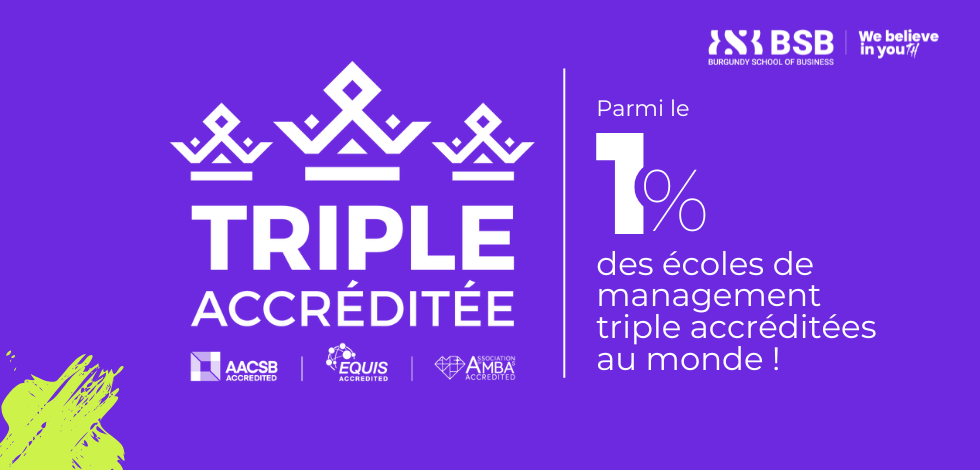Business school salary: what can you really expect?

Salary after business school is bound to be a question you ask yourself. And you are right. At the exit, the average is around €42,000 gross per year. A good starting point... but that number doesn't come out of the blue.
This salary depends on your school, the sector chosen, your internships... and above all, on your ability to sell yourself and make the right decisions from the start.
We were in your shoes. The moment when we compare, when we doubt, when we wonder if we are not going to miss out on a better opportunity. That's why we're talking to you frankly here. We will dissect the numbers, trends, levers to activate and mistakes to avoid to help you aim higher.
Are you ready? We're going together.
Salaries at the end of business schools
When we talk about salary, we need concrete figures. Here's what you can expect when you get out, based on the most recent studies.
Global figures to help you locate yourself
On average, a young business school graduate starts with 40,000 to 42,000 euros gross annually, including bonuses, according to the latest survey by the Conference of Grandes Écoles (CGE, 2023). This figure places these graduates among the best paid in the job market.
Significant differences between schools
If you integrate one of Top 5 schools, so the salaries announced at the exit revolve around 50,000 to 60,000€ gross per year, in particular thanks to opportunities in finance or international consulting.
Don't worry, if you do a Recognized Grande École de Commerce, accredited and well classified, the salaries offered at the exit are generally between 36,000 and 42,000€ gross annual. Rapid developments are possible thanks to the professional experience accumulated during your studies and at the beginning of your career, not to mention the valuable network of your school.
Rewards and benefits not to be forgotten
In addition to a fixed salary, young graduates often benefit from performance bonuses, restaurant tickets, mobility benefits or reinforced health insurance. In some sectors such as finance or consulting, these bonuses can represent up to 15 to 20% of annual remuneration.
📌 Students who obtain their Master Grande Ecole at BSB have a salary between 42,000 and 45,000€ in gross salary at the end of their studies and go from 48,000€ to 54,000€ average gross annual salary in France with bonuses, 3 years after obtaining the Master Grande Ecole BSB.
Factors that influence your first paycheck
As you have seen, the salary after business school varies enormously. But what does this difference really depend on? Here are the three main levers that can increase or limit your first earnings.
The sector of activity and the position occupied
That is the first factor. Some sectors pay better at the start of working life. If you are moving towards the corporate finance, strategy consulting and private equity, you will be offered higher salaries. In these areas, you can aim for 45,000 to 55,000 euros gross per year from your first job, not including bonuses.
The digital marketing, the communication or even the human resources offer more modest salaries at the start, between 35,000 and 40,000 euros gross per year, but with rapid changes if you are proactive in your career and know how to stand out.
What salary by sector after business school?
Here are the annual gross salary ranges that you can claim from your first job, depending on the sector of activity chosen:
These figures come from the 2023 CGE surveys and Apec consolidated data.
The choice of sector has a strong impact on your first salary, but it is never fixed. Specialization, skills development and mobility can quickly change these amounts.
Geographical and international location
Unsurprisingly, Work in Paris or in a major international metropolis (London, Geneva, Dubai) allows you to Negotiate a higher salary, often increased by 10 to 20% compared to posts in the provinces. Also, do not forget that the cost of living in these megacities is just as high.
Internationally, some contracts also include complete packages: expatriation grants, housing, tax benefits.
At BSB, 40% of our graduates have an international position.
Your experiences and internships during your studies
Business schools don't just give you a degree: they give you the opportunity to gain professional experiences.
A student who has directed two long internships or a work-study program in a demanding sector, or even a experience abroad, will be able Negotiate a higher salary and have easier access to the most selective companies.
Don't overlook any project during your student years: These are the lines on your resume that will make the difference during the first salary negotiations.
The size and type of business also influence your salary
Choosing your first employer has a direct impact on your remuneration. Major international groups offer higher packages, with entry-level salaries that are often located At the top of the range, bonuses and additional benefits (participation, profit-sharing, premium mutual insurance, restaurant tickets, RTT, etc.).
On the other hand, start-ups and SMEs offer lower salaries at the start, often between 33,000 and 38,000€ gross per year, but sometimes offset by greater autonomy, expanded responsibilities and the potential for rapid change.
The public sector, international organizations or NGOs offer more controlled salary grids. The salaries are generally there less attractive in the short term, but these structures offer a secure environment and significant social benefits.
The right reflex: don't just look at the gross salary, but the whole of Package And the prospects for development at 2 or 3 years old.

How to optimize your salary after business school?
Your degree is a great place to start, but it's not enough on its own. It is your choices, your skills and your posture that will make the difference in your negotiations and in the evolution of your remuneration. Here are the concrete levers to activate.
The keys to a successful salary negotiation
The first rule: get ready. Before an interview or a contract proposal, find out about the salary scales in the sector and the level of requirement of the position. Never go blind.
During the negotiation, show that you know your worth. Rely on your experiences (internships, apprenticeships, projects), your key skills and your ability to adapt.
👉 Quick advice: don't give too low a range for fear of “missing the opportunity” you risk holding yourself back. Prefer to talk about “remuneration consistent with the market and your skills” and wait for the employer's proposal before adjusting.
Develop differentiating skills
Degrees and academic paths are similar. What makes the difference are the specific and rare skills.
Some examples that instantly enhance a junior profile:
- Mastery of a specific software or business tool (e.g.: Power BI, Salesforce, Hubspot...).
- An additional certification (TOSA, Google Analytics, CFA level 1 for finance, AMF...).
- Strong language skills, with a recent and high TOEIC or TOEFL score.
The more you show that you can quickly add value without the need for long training, the more weight you have in the negotiation.
Soft skills that increase your market value
Beyond technical skills and the diploma, they are your human qualities and your professional posture that weigh heavily in the balance. Employers are looking for young graduates who can integrate quickly, communicate with impact, and manage complex situations.
The most valued soft skills at the start of a career:
- Adaptability : businesses evolve quickly, and they want profiles that can keep up with the times.
- Relationships and public speaking : knowing how to defend your ideas and work effectively in a team makes all the difference.
- Analytical spirit and initiative taking : you will be recruited to provide solutions, not just perform tasks.
- Curiosity and the ability to learn quickly : recruiters appreciate profiles that do not settle for the minimum and seek to progress.
In an interview, illustrate these soft skills with concrete examples (team project, associative responsibility, project management during an internship). It is these stories that will tip the balance towards a more advantageous package.
📌 In September 2025, BSB launched the Leader Skills Institute in order to learn as soon as you enter the Bachelor in Management the skills necessary to develop your leadership as well as the soft and core skills that AI will not be able to teach you. Go beyond the hard skills and pure technical skills that recruiters are looking for.
Our devicePathfinder exclusive support was created to coach students in the three important dimensions of personal and professional development: self-knowledge, academic career and professional project.
Activate your network and seize the right opportunities
Never underestimate the power of the network. The most interesting offers often circulate before they are even published.
Participate in corporate forums, solicit former classmates, and dare to send messages to graduates on LinkedIn. Alumni often appreciate helping younger generations and may recommend you to apply.
📌 At BSB, the network of 20,000 alumni And the device Pathfinder Are of real accelerators to get opportunities with advantageous packages.
What is the salary evolution after 5, 10 and 15 years of career?
Your first salary is a base, but it is your career choices, your sector and your mobility that will make your trajectory. Here's what you can expect, sector by sector.
5-year trends by sector
- Finance and audit : senior analyst, financial controller or manager in an audit firm.
Average salary after 5 years : between 60,000 and 70,000€ gross/year (source: Apec 2023). - Strategy consultancy : senior consultant or mission manager.
Average salary after 5 years : 65,000 to 75,000€ gross/year, not including annual bonuses (source: Diplomeo, CGE). - Digital marketing : marketing group leader, e-commerce manager.
Average salary : 50,000 to 60,000€ gross/year, with a strong evolution possible by going on the customer side (source: Apec 2023). - Business development : key account manager, deputy commercial director.
Average salary : between 55,000 and 65,000€ gross/year.
At 10 years, strategic and sectorized positions
- Finance : deputy financial director, senior M&A manager.
Median wage at 10 : between 90,000 and 110,000€ gross/year, depending on the size of the company and the location (source: CGE). - consultancy : junior partner, practice director.
Remuneration : often €100,000 and more, with an important variable share and advantages (source: Business Cool 2024). - Marketing : deputy marketing director, head of digital strategy.
Fork : between 75,000 and 90,000€ gross/year, plus performance-related bonuses.
At 15, general management or entrepreneurship
- In large groups, many reach the positions of deputy managing director, group financial director, international sales director.
Salaries vary between €150,000 and €200,000 gross annually, with profit-sharing and stock options (source: CGE). - In consulting, becoming a senior partner or creating your own firm can lead to salaries in excess of €250,000 per year.
- In entrepreneurship, it is difficult to talk about a fixed salary, but some former graduates have raised funds in excess of several million euros and receive salaries equivalent to senior managers.

Mistakes to avoid in order not to stagnate professionally
Even with a good degree and a promising start, some mistakes can hinder your salary growth and limit your career development. Here are the ones that recruiters and alumni spot the most — absolutely avoid:
- Be content with your first job without striving for better.
Staying in the same position for too long without trying to evolve or change missions can lock you into a box that is difficult to overcome.
- Lack of geographic or sectoral mobility.
Accepting to change regions, countries or sectors can be a career accelerator. Staying stuck in a comfort zone limits opportunities and pay increases. - Neglecting continuing education and the acquisition of new skills.
Profiles who are technically stagnant or who do not keep up to date with the changes in their profession see their value decrease on the market. - Underestimate the power of the network.
Many positions (the most strategic and the best paid) are never published. They circulate via the network. Not maintaining your alumni and professional network is a strategic mistake. - Accept an underpaid position without a medium-term plan.
Sometimes, a compromise is necessary for a first job, but be careful not to get stuck without a rebound strategy.
Remember: your evolution does not only depend on your degree, but on your ability to remain proactive, mobile, curious, and maintain your network
FAQ — Frequently asked questions about salary after business school
What is the average salary at the end of business school?
The average salary at the end of business school is between 40,000 and 42,000 euros gross annually, including bonuses (source: CGE 2023). This amount varies by school, sector and location.
What sectors offer the best salaries?
Corporate finance, strategy consulting and private equity remain the most profitable. This is followed by international business development and positions related to data and digital technology.L.
Does the size of the company really influence the salary?
Yes. Les large international groups offer more generous packages (benefits included), while start-ups or SMEs often offer a lower salary but compensate by extended responsibilities and a potential for rapid development.
Is a diploma enough to make a good living?
The degree is a solid foundation, but it is your career choices, your ability to train, cultivate your network and seize opportunities that will make the difference in the long run.
How much can you expect to earn after 10 or 15 years of career?
Depending on the sector, between €90,000 and €110,000 gross annually after 10 years, and up to €150,000 to €200,000 for management positions after 15 years (source: Apec, CGE).





To remember